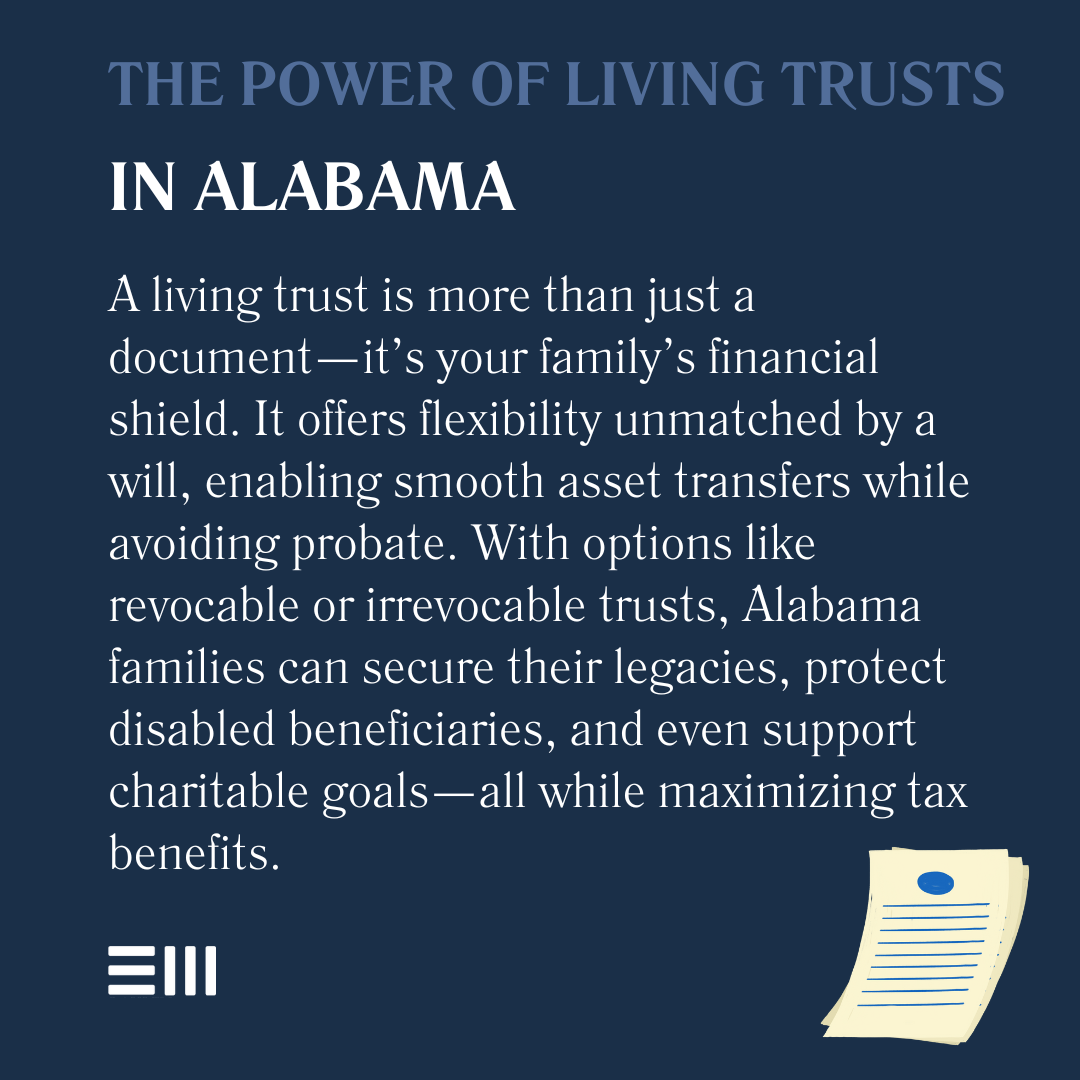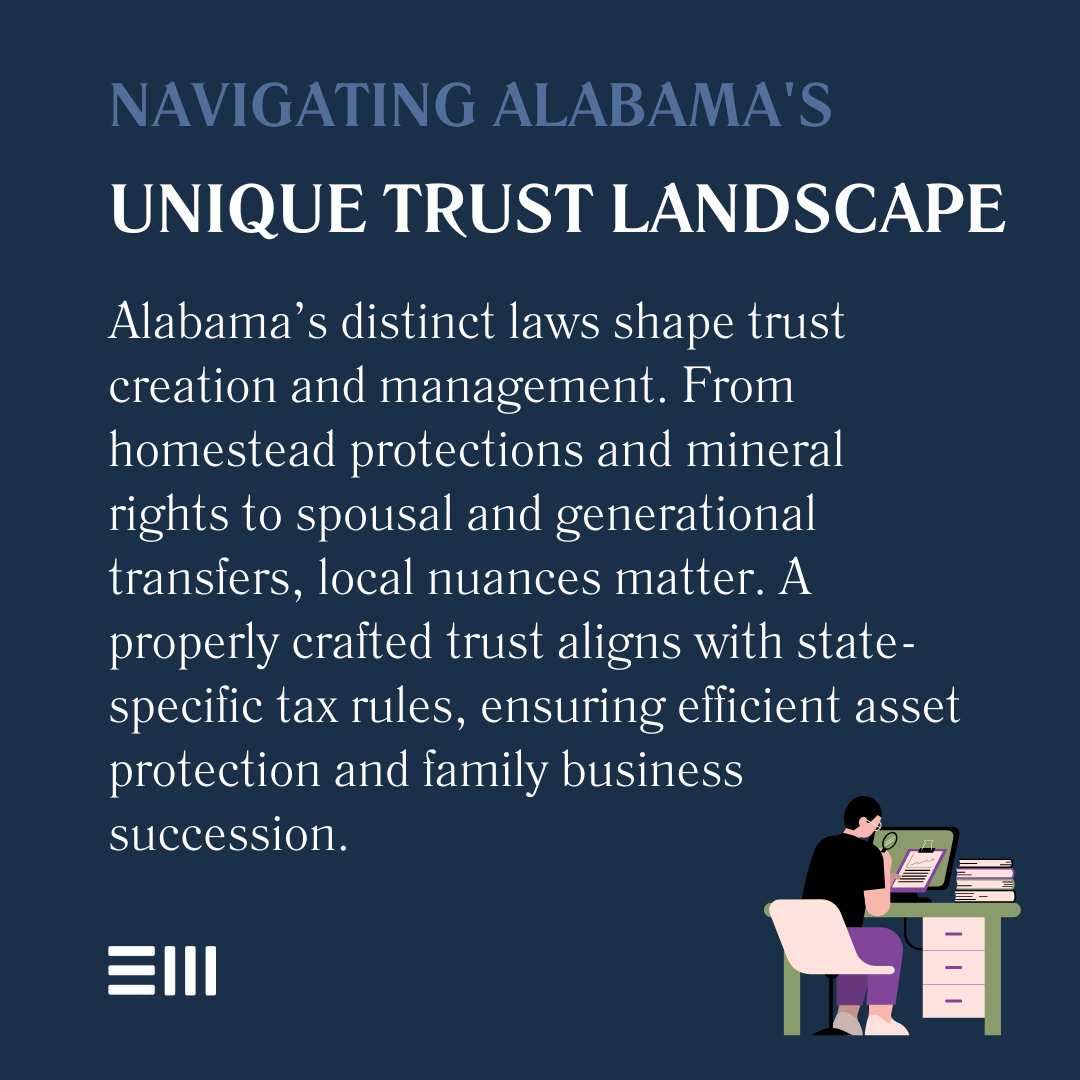Behind every historic Alabama estate and family business lies a story of careful planning and protection.
From antebellum homes passed down through generations to modern tech startups ensuring their legacy, Alabama families have long understood that true wealth preservation requires more than just good intentions.
A living trust serves as your family's financial fortress, protecting assets while offering flexibility that a simple will cannot match.
Understanding Living Trusts in Alabama
Before diving into specific trust types and structures, it's important to recognize that Alabama law provides numerous options for trust creation, each serving different family situations and financial goals.
The choice of trust structure impacts everything from tax treatment to beneficiary rights, making it essential to understand the full range of possibilities available to Alabama residents.
Types of Living Trusts:
- Revocable Living Trusts: Maintain control while alive, offer flexibility for changes;
- Irrevocable Living Trusts: Provide tax benefits and asset protection;
- Special Needs Trusts: Support disabled beneficiaries while preserving benefits;
- Charitable Trusts: Balance philanthropic goals with family needs;
- Spendthrift Trusts: Protect beneficiaries from creditors;
- Qualified Personal Residence Trusts: Transfer homes efficiently;
- Generation-Skipping Trusts: Pass wealth to grandchildren tax-efficiently; and
- Business Succession Trusts: Ensure smooth transition of family enterprises.
Trust Operation Elements:
- Grantor rights and responsibilities;
- Trustee powers and limitations;
- Beneficiary interests and protections;
- Trust modification procedures;
- Distribution requirements;
- Investment guidelines;
- Tax reporting obligations; and
- Privacy provisions.
With these fundamental elements in place, you'll be better positioned to work with legal counsel to select and implement the trust structure that best serves your family's unique needs while maximizing asset protection under Alabama law.
Benefits of Working With a Trust Attorney
While establishing a trust might seem straightforward at first glance, the complexities of Alabama trust law and federal tax regulations create numerous pitfalls for the unwary.
Professional legal guidance navigates these challenges while ensuring your trust achieves its intended purpose without running afoul of state or federal requirements.
Legal Navigation:
- State-specific trust laws;
- Federal tax regulations;
- Property transfer requirements;
- Beneficiary rights;
- Creditor protection rules;
- Business succession laws;
- Healthcare directives; and
- Power of attorney integration.
Document Development:
- Trust agreement crafting;
- Asset transfer documents;
- Tax planning instruments;
- Healthcare directives;
- Powers of attorney;
- Living wills;
- Property deeds; and
- Business transfer agreements.
Ongoing Support Services:
- Trust amendments;
- Asset transfers;
- Tax strategy updates;
- Beneficiary modifications;
- Trust administration guidance;
- Legal compliance monitoring;
- Family communication support; and
- Dispute resolution assistance.
By leveraging professional legal expertise in these areas, you can avoid costly mistakes and ensure your trust provides maximum benefit to your beneficiaries while meeting all legal requirements for validity and enforcement under Alabama law.
Trust Administration and Management
Successfully managing a trust requires more than just following basic procedures - it demands careful attention to numerous legal, financial, and administrative details that can impact the trust's effectiveness.
Understanding these responsibilities helps trustees fulfill their fiduciary duties while protecting beneficiary interests and trust assets.
Trustee Duties:
- Asset management;
- Investment oversight;
- Distribution handling;
- Tax compliance;
- Record keeping;
- Beneficiary communication;
- Expense management; and
- Conflict resolution.
Investment Considerations:
- Risk management;
- Portfolio diversification;
- Income generation;
- Growth strategies;
- Tax efficiency;
- Market monitoring;
- Rebalancing procedures; and
- Performance reporting.
Administrative Tasks:
- Account maintenance;
- Property management;
- Insurance coverage;
- Tax preparation;
- Beneficiary updates;
- Document storage;
- Annual reviews; and
- Compliance monitoring.
Through careful attention to these administrative requirements and regular review of trust operations, trustees can ensure the trust continues to serve its intended purpose while maintaining compliance with all applicable laws and regulations.
Special Considerations for Alabama Trusts
Alabama's unique legal landscape creates specific considerations for trust creation and management:
Property Laws:
- Homestead protections;
- Community property rules;
- Real estate transfers;
- Mineral rights;
- Agricultural land; and
- Business interests.
Family Provisions:
- Spousal rights;
- Children's interests;
- Generational transfers;
- Family business succession;
- Education funding; and
- Healthcare provisions.
Tax Planning:
- State tax implications;
- Federal estate tax;
- Generation-skipping tax;
- Income tax planning;
- Charitable deductions; and
- Business succession.
Understanding these Alabama-specific elements ensures your trust aligns with state law while maximizing benefits.
Common Trust Planning Mistakes
Awareness of potential pitfalls helps ensure your trust achieves its intended purposes:
Formation Errors:
- Improper funding;
- Incomplete transfers;
- Missing provisions;
- Unclear instructions;
- Tax oversights; and
- Beneficiary conflicts.
Administrative Issues:
- Poor record keeping;
- Delayed funding;
- Incomplete transfers;
- Missing updates;
- Tax filing errors; and
- Communication gaps.
Planning Oversights:
- Inadequate provisions;
- Missing contingencies;
- Tax inefficiencies;
- Successor trustee issues;
- Distribution problems; and
- Privacy breaches.
Avoiding these common mistakes strengthens your trust's effectiveness and ensures smooth administration.
Frequently Asked Questions About Alabama Living Trusts
Understanding the complexities of living trusts often raises important questions. Here are answers to common concerns about creating and managing trusts in Alabama.
How Does a Living Trust Differ From a Will?
A living trust offers immediate asset protection and avoids probate, while a will only takes effect after death and requires court oversight.
What Assets Should Be Placed in a Trust?
Consider transferring real estate, investments, business interests, and valuable personal property while maintaining some assets outside for practical purposes.
Can I Modify My Trust After Creation?
Revocable trusts allow changes during your lifetime, while irrevocable trusts generally cannot be modified without specific circumstances or court approval.
Who Should Serve as Successor Trustee?
Choose someone trustworthy, financially responsible, and capable of managing complex affairs, whether a family member, friend, or professional trustee.
How Long Does Trust Creation Take?
The process typically takes several weeks to complete, including document preparation, asset transfers, and funding verification.
What Are the Tax Implications of Different Trust Types?
Different trust structures offer varying tax advantages and consequences, affecting both current income and future estate taxes.
How Does Trust Protection Work for Business Assets?
Business interests can be protected through specialized trust provisions while maintaining operational control and succession planning.
What Role Does a Trust Play in Business Succession?
Trusts facilitate smooth business transitions while minimizing tax impact and preserving family relationships.
How Are Digital Assets Handled in a Trust?
Modern trusts can include provisions for cryptocurrency, online accounts, and digital property management.
What Happens if a Trustee Cannot Serve?
Successor trustee provisions ensure continuous trust management when primary trustees become unavailable.
Secure Your Family's Future
Your legacy deserves the protection and careful planning that only an experienced Alabama trust attorney can provide.
Our team offers:
- Personalized trust solutions;
- Comprehensive asset protection;
- Tax-efficient strategies;
- Clear communication; and
- Ongoing support.
Schedule a confidential consultation to discuss your family's needs and create a trust that preserves your legacy for generations to come.


